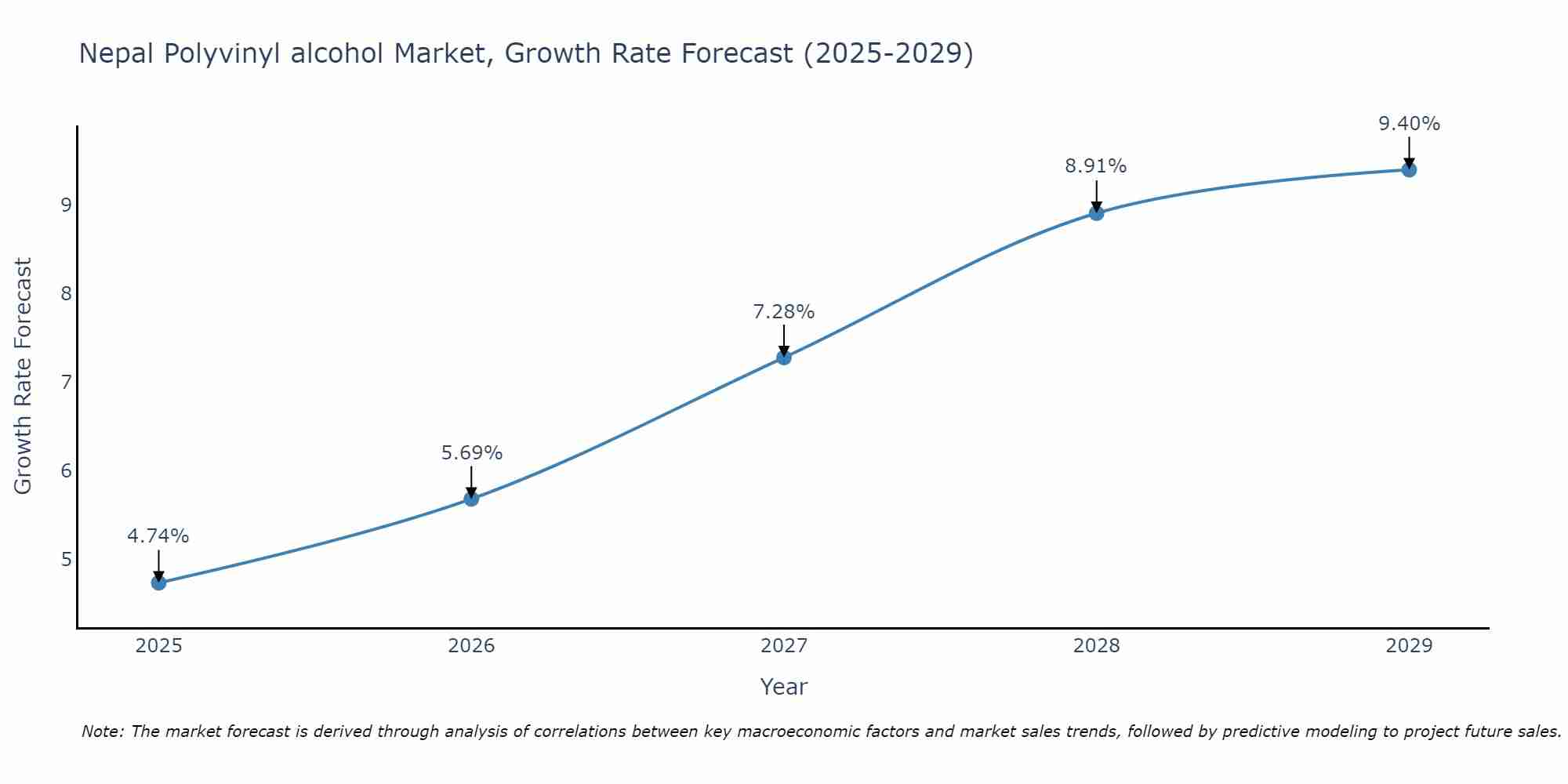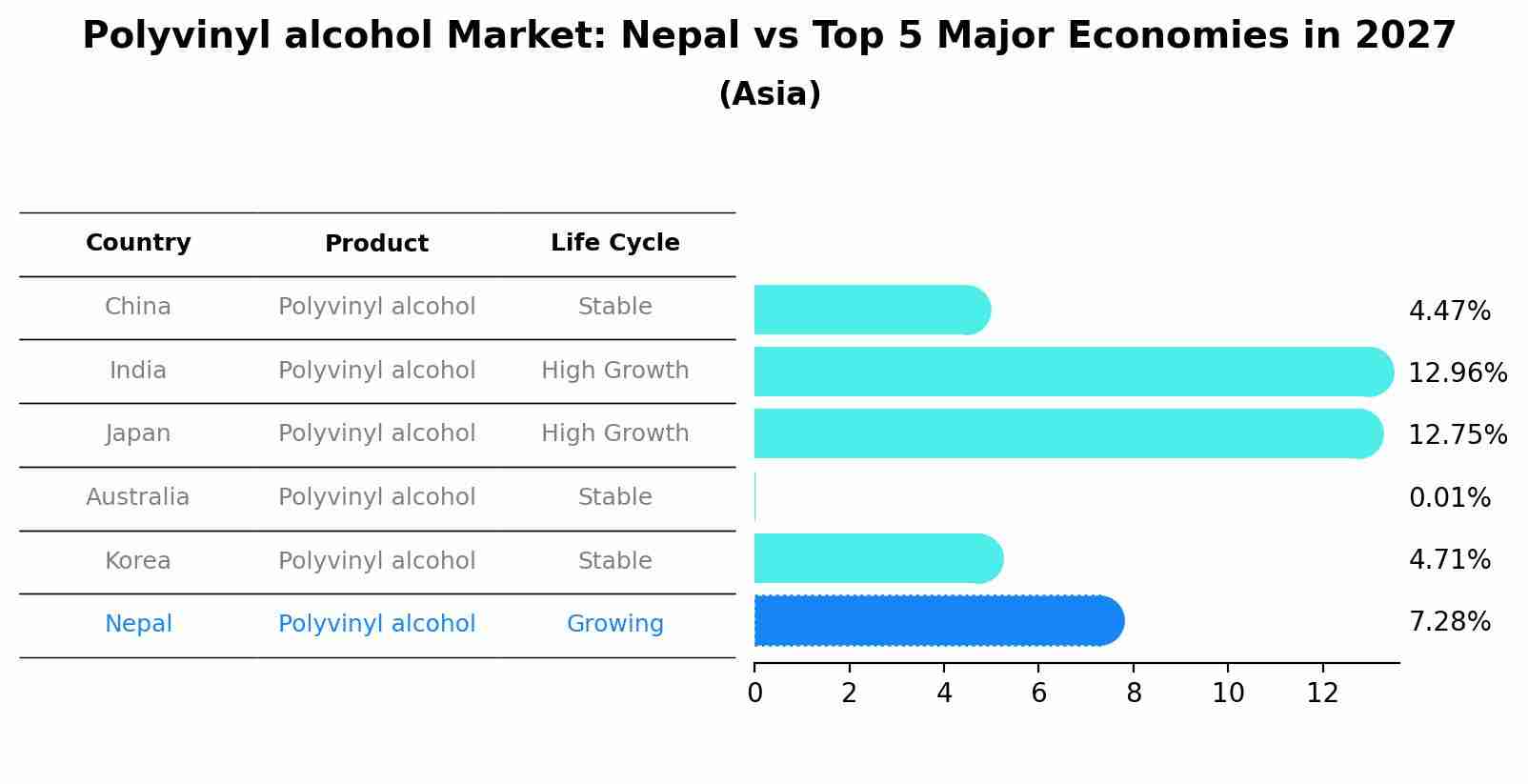Nepal Polyvinyl alcohol Market (2025-2031) Outlook | Forecast, Value, Industry, Companies, Growth, Revenue, Trends, Size, Analysis & Share
| Product Code: ETC092095 | Publication Date: Jun 2021 | Updated Date: Jun 2025 | Product Type: Report | |
| Publisher: 6Wresearch | Author: Ravi Bhandari | No. of Pages: 70 | No. of Figures: 35 | No. of Tables: 5 |
Nepal Polyvinyl alcohol Market Size Growth Rate
The Nepal Polyvinyl alcohol Market is likely to experience consistent growth rate gains over the period 2025 to 2029. From 4.74% in 2025, the growth rate steadily ascends to 9.40% in 2029.

Polyvinyl alcohol Market: Nepal vs Top 5 Major Economies in 2027 (Asia)
By 2027, the Polyvinyl alcohol market in Nepal is anticipated to reach a growth rate of 7.28%, as part of an increasingly competitive Asia region, where China remains at the forefront, supported by India, Japan, Australia and South Korea, driving innovations and market adoption across sectors.

Nepal Polyvinyl alcohol Market Overview
The Nepal Polyvinyl alcohol (PVA) market is experiencing steady growth driven by increasing demand from various end-use industries such as construction, textiles, packaging, and adhesives. PVA is widely used in these industries due to its excellent film-forming and adhesive properties. The market is also benefiting from the growing awareness about eco-friendly products, as PVA is biodegradable and non-toxic. Additionally, the government`s focus on infrastructure development projects is further boosting the demand for PVA-based products in the construction sector. Key players in the Nepal PVA market are focusing on product innovation and strategic partnerships to expand their market presence. The market is expected to continue its growth trajectory in the coming years, supported by the country`s overall economic development and increasing industrial activities.
Nepal Polyvinyl alcohol Market Trends
The Nepal Polyvinyl alcohol (PVA) market is experiencing growth due to its increasing applications in sectors such as construction, textiles, packaging, and electronics. The demand for PVA is driven by its biodegradability, water solubility, and non-toxic nature, making it an attractive choice for eco-friendly products. Additionally, the growing awareness about sustainability and environmental concerns is further boosting the adoption of PVA in various industries. Manufacturers in Nepal are focusing on developing innovative PVA products with enhanced properties to cater to the evolving needs of consumers. The market is also witnessing investments in research and development to explore new applications and improve the overall quality of PVA products, indicating a positive outlook for the Nepal Polyvinyl alcohol market in the coming years.
Nepal Polyvinyl alcohol Market Challenges
In the Nepal Polyvinyl alcohol market, several challenges are faced, including limited awareness among consumers about the benefits and applications of PVA products, lack of standardized quality control measures leading to inconsistent product quality, and limited availability of raw materials resulting in supply chain disruptions. Additionally, the market faces stiff competition from alternative products and materials, as well as pricing pressures due to fluctuating input costs. Infrastructure constraints and regulatory hurdles further hinder the growth of the PVA market in Nepal. Overcoming these challenges will require industry players to focus on educating consumers, enhancing product quality standards, diversifying sourcing strategies, and advocating for supportive policies to promote market growth.
Nepal Polyvinyl alcohol Market Investment Opportunities
In the Nepal Polyvinyl alcohol (PVA) market, there are several investment opportunities worth considering. With the growing demand for PVA in various industries such as textiles, construction, packaging, and pharmaceuticals, investing in PVA production or distribution could be lucrative. Additionally, there is a rising trend towards eco-friendly and biodegradable products, making PVA a favorable choice due to its biodegradable nature. Collaborating with local manufacturers to improve production efficiency and quality could also be a promising investment opportunity. Furthermore, exploring research and development initiatives to innovate new applications for PVA could open up new market segments and drive growth in the Nepal PVA market. Overall, investing in the Nepal Polyvinyl alcohol market presents opportunities for growth and diversification within the country`s industrial sector.
Nepal Polyvinyl alcohol Market Government Policy
Government policies related to the Nepal Polyvinyl alcohol market encompass regulations on import and export, quality standards, and environmental sustainability. The government of Nepal has implemented import restrictions on certain chemicals used in the production of polyvinyl alcohol to protect domestic manufacturers. Quality control measures, such as product certifications and testing requirements, are in place to ensure that polyvinyl alcohol products meet established standards. Furthermore, environmental regulations mandate proper disposal practices for waste generated during production processes to minimize negative impacts on the environment. Overall, these policies aim to promote a competitive and sustainable polyvinyl alcohol market in Nepal while safeguarding public health and environmental well-being.
Nepal Polyvinyl alcohol Market Future Outlook
The future outlook for the Nepal Polyvinyl alcohol (PVA) market appears promising, with steady growth anticipated in the coming years. Factors such as increasing demand for PVA in industries like construction, textiles, packaging, and pharmaceuticals are expected to drive market expansion. Additionally, the growing awareness about the benefits of PVA, such as its eco-friendly and versatile nature, is likely to further boost its adoption in various applications. With the government`s focus on infrastructure development and increasing investments in key sectors, the demand for PVA is projected to rise. To capitalize on these opportunities, key market players are likely to invest in research and development activities to introduce innovative PVA products, ensuring a competitive edge in the market.
Key Highlights of the Report:
- Nepal Polyvinyl alcohol Market Outlook
- Market Size of Nepal Polyvinyl alcohol Market, 2021
- Forecast of Nepal Polyvinyl alcohol Market, 2031
- Historical Data and Forecast of Nepal Polyvinyl alcohol Revenues & Volume for the Period 2021 - 2031
- Nepal Polyvinyl alcohol Market Trend Evolution
- Nepal Polyvinyl alcohol Market Drivers and Challenges
- Nepal Polyvinyl alcohol Price Trends
- Nepal Polyvinyl alcohol Porter's Five Forces
- Nepal Polyvinyl alcohol Industry Life Cycle
- Historical Data and Forecast of Nepal Polyvinyl alcohol Market Revenues & Volume By Grade for the Period 2021 - 2031
- Historical Data and Forecast of Nepal Polyvinyl alcohol Market Revenues & Volume By Partially Hydrolyzed for the Period 2021 - 2031
- Historical Data and Forecast of Nepal Polyvinyl alcohol Market Revenues & Volume By Fully Hydrolyzed for the Period 2021 - 2031
- Historical Data and Forecast of Nepal Polyvinyl alcohol Market Revenues & Volume By End-use Industry for the Period 2021 - 2031
- Historical Data and Forecast of Nepal Polyvinyl alcohol Market Revenues & Volume By Food Packaging for the Period 2021 - 2031
- Historical Data and Forecast of Nepal Polyvinyl alcohol Market Revenues & Volume By Textile for the Period 2021 - 2031
- Historical Data and Forecast of Nepal Polyvinyl alcohol Market Revenues & Volume By Paper for the Period 2021 - 2031
- Historical Data and Forecast of Nepal Polyvinyl alcohol Market Revenues & Volume By Medical for the Period 2021 - 2031
- Historical Data and Forecast of Nepal Polyvinyl alcohol Market Revenues & Volume By Construction for the Period 2021 - 2031
- Historical Data and Forecast of Nepal Polyvinyl alcohol Market Revenues & Volume By Electronics for the Period 2021 - 2031
- Nepal Polyvinyl alcohol Import Export Trade Statistics
- Market Opportunity Assessment By Grade
- Market Opportunity Assessment By End-use Industry
- Nepal Polyvinyl alcohol Top Companies Market Share
- Nepal Polyvinyl alcohol Competitive Benchmarking By Technical and Operational Parameters
- Nepal Polyvinyl alcohol Company Profiles
- Nepal Polyvinyl alcohol Key Strategic Recommendations
Frequently Asked Questions About the Market Study (FAQs):
- Single User License$ 1,995
- Department License$ 2,400
- Site License$ 3,120
- Global License$ 3,795
Search
Thought Leadership and Analyst Meet
Our Clients
Related Reports
- Germany Breakfast Food Market (2026-2032) | Industry, Share, Growth, Size, Companies, Value, Analysis, Revenue, Trends, Forecast & Outlook
- Australia Briquette Market (2025-2031) | Growth, Size, Revenue, Forecast, Analysis, Trends, Value, Share, Industry & Companies
- Vietnam System Integrator Market (2025-2031) | Size, Companies, Analysis, Industry, Value, Forecast, Growth, Trends, Revenue & Share
- ASEAN and Thailand Brain Health Supplements Market (2025-2031) | Strategy, Consumer Insights, Analysis, Investment Trends, Opportunities, Growth, Size, Share, Industry, Revenue, Segments, Value, Segmentation, Supply, Forecast, Restraints, Outlook, Competition, Drivers, Trends, Demand, Pricing Analysis, Competitive, Strategic Insights, Companies, Challenges
- ASEAN Bearings Market (2025-2031) | Strategy, Consumer Insights, Analysis, Investment Trends, Opportunities, Growth, Size, Share, Industry, Revenue, Segments, Value, Segmentation, Supply, Forecast, Restraints, Outlook, Competition, Drivers, Trends, Demand, Pricing Analysis, Competitive, Strategic Insights, Companies, Challenges
- Europe Flooring Market (2025-2031) | Outlook, Share, Industry, Trends, Forecast, Companies, Revenue, Size, Analysis, Growth & Value
- Saudi Arabia Manlift Market (2025-2031) | Outlook, Size, Growth, Trends, Companies, Industry, Revenue, Value, Share, Forecast & Analysis
- Uganda Excavator, Crane, and Wheel Loaders Market (2025-2031) | Strategy, Consumer Insights, Analysis, Investment Trends, Opportunities, Growth, Size, Share, Industry, Revenue, Segments, Value, Segmentation, Supply, Forecast, Restraints, Outlook, Competition, Drivers, Trends, Demand, Pricing Analysis, Competitive, Strategic Insights, Companies, Challenges
- Rwanda Excavator, Crane, and Wheel Loaders Market (2025-2031) | Strategy, Consumer Insights, Analysis, Investment Trends, Opportunities, Growth, Size, Share, Industry, Revenue, Segments, Value, Segmentation, Supply, Forecast, Restraints, Outlook, Competition, Drivers, Trends, Demand, Pricing Analysis, Competitive, Strategic Insights, Companies, Challenges
- Kenya Excavator, Crane, and Wheel Loaders Market (2025-2031) | Strategy, Consumer Insights, Analysis, Investment Trends, Opportunities, Growth, Size, Share, Industry, Revenue, Segments, Value, Segmentation, Supply, Forecast, Restraints, Outlook, Competition, Drivers, Trends, Demand, Pricing Analysis, Competitive, Strategic Insights, Companies, Challenges
Industry Events and Analyst Meet
Whitepaper
- Middle East & Africa Commercial Security Market Click here to view more.
- Middle East & Africa Fire Safety Systems & Equipment Market Click here to view more.
- GCC Drone Market Click here to view more.
- Middle East Lighting Fixture Market Click here to view more.
- GCC Physical & Perimeter Security Market Click here to view more.
6WResearch In News
- Doha a strategic location for EV manufacturing hub: IPA Qatar
- Demand for luxury TVs surging in the GCC, says Samsung
- Empowering Growth: The Thriving Journey of Bangladesh’s Cable Industry
- Demand for luxury TVs surging in the GCC, says Samsung
- Video call with a traditional healer? Once unthinkable, it’s now common in South Africa
- Intelligent Buildings To Smooth GCC’s Path To Net Zero


















